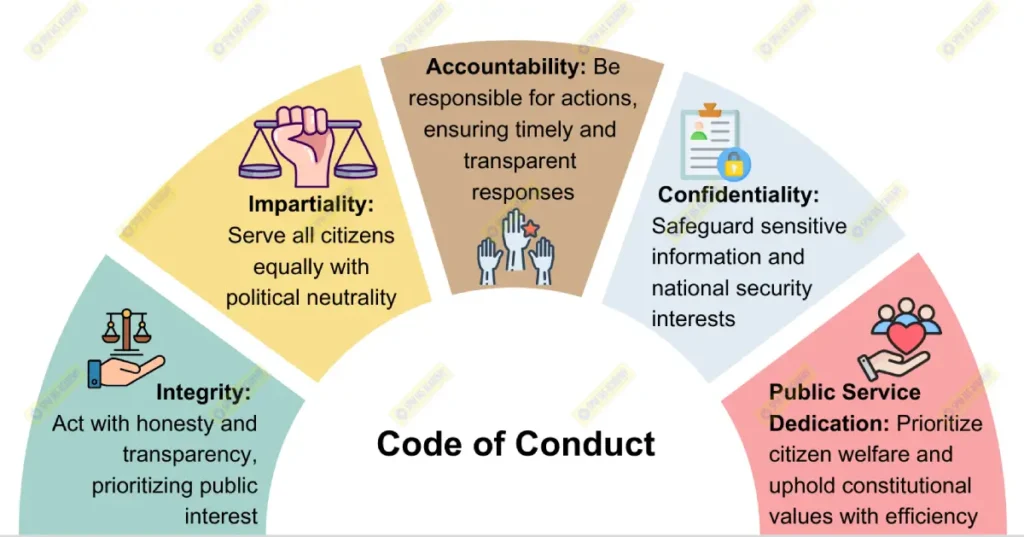The Second Administrative Reforms Commission (ARC), in its report “Ethics in Governance,” highlighted the need for a well-defined Code of Conduct for public officials to strengthen ethical governance. These recommendations are built on core values such as integrity, impartiality, transparency, empathy, and accountability, ensuring that public service remains aligned with constitutional ideals.
1. Integrity: The Foundation of Public Trust
Integrity is the cornerstone of ethical governance. It ensures that civil servants remain incorruptible and prioritize public welfare over personal or external pressures. For example, E. Sreedharan, the “Metro Man of India,” upheld integrity by delivering the Delhi Metro project on time, despite bureaucratic and political challenges. His unwavering commitment to honesty and efficiency became a benchmark for public service.
As Mahatma Gandhi said, “You may never know what results come of your actions, but if you have no integrity, there can be no trust.” Integrity fosters confidence among citizens and strengthens governance systems.

2. Impartiality: Ensuring Fair and Just Decisions
Civil servants must act without bias, ensuring that decisions are based solely on merit and public interest. Impartiality is crucial in a diverse society like India, where governance often intersects with caste, religion, and political affiliations. The impartial leadership of T.N. Seshan, former Chief Election Commissioner, exemplifies this value. He reformed India’s electoral system to ensure free and fair elections, earning public trust.
As Lord Hewart aptly observed, “Justice must not only be done but must also be seen to be done.” Impartiality ensures equity in the delivery of public services.
3. Transparency and Accountability: Fostering Public Confidence
The ARC emphasized the need for transparency and accountability in decision-making to build trust and reduce corruption. Civil servants must ensure their actions are open to public scrutiny, enabling citizens to hold them accountable. The Right to Information (RTI) Act (2005) embodies this principle, empowering citizens to access government information.
For instance, proactive disclosure of financial allocations in rural development schemes has curbed misuse of funds and increased public trust. Justice Louis Brandeis remarked, “Sunlight is the best disinfectant,” underscoring the value of transparency in governance.
4. Empathy and Compassion: The Human Side of Governance
The ARC stressed the need for empathy and compassion, particularly toward marginalized and vulnerable sections. These values ensure that governance addresses the real needs of society. For example, Armstrong Pame, an IAS officer in Manipur, personally mobilized resources to construct a 100-km road for a remote tribal village. His empathy bridged infrastructural gaps, transforming lives in the region.
This aligns with Mahatma Gandhi’s philosophy of “Sarvodaya,” or the upliftment of all, which remains a guiding principle for public service.
5. Avoidance of Conflict of Interest
Civil servants must prevent conflict of interest where personal or familial interests could compromise their duties. The ARC recommended clear guidelines to identify and avoid such situations. An illustrative case is Ashok Khemka, an IAS officer who canceled questionable land deals despite facing political backlash, demonstrating his commitment to public welfare over personal or external pressures.
As Potter Stewart said, “Ethics is knowing the difference between what you have a right to do and what is right to do.”
6. Whistleblower Protection: Safeguarding Ethical Governance
The ARC advocated for protecting whistleblowers to encourage the reporting of unethical practices without fear of retaliation. Laws like the Whistleblower Protection Act (2014) enable civil servants to expose corruption and malpractices, fostering a culture of accountability. This is critical for maintaining public trust in institutions.
The recommendations of the Second ARC provide a framework for embedding ethical values in public service. By upholding integrity, impartiality, transparency, empathy, and accountability, civil servants can ensure governance that is both effective and moral. As Dr. S. Radhakrishnan remarked, “The end-product of education should be a free creative man, who can battle against historical circumstances and adversities of nature.” Civil servants must embody these principles to lead with both competence and conscience, ensuring the trust and welfare of the people they serve.











